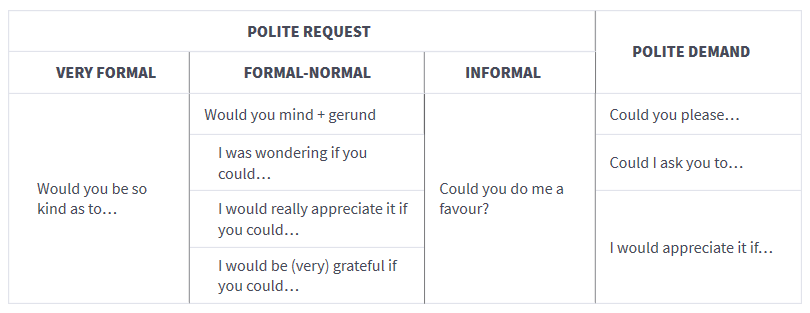Dans notre travail, nous sommes tous confrontés à la nécessité de nous tourner vers quelqu'un pour obtenir de l'aide. En anglais, la différence entre une demande polie et une demande de faire quelque chose peut être difficile à saisir, car il existe des règles bien établies basées sur des coutumes et des normes généralement acceptées plutôt que sur la logique. Cependant, il est très important de ressentir cette différence. Par une mauvaise manipulation, nous pouvons non seulement échouer à atteindre le résultat souhaité, mais aussi offenser l'interlocuteur. Comme vous le savez probablement déjà, en anglais, contrairement à beaucoup d'autres, ajouter simplement "please" ne suffit pas. Notre collègue, Scott Boyce, EPAM Language Trainer, a examiné plusieurs façons de rédiger des requêtes en anglais et a examiné les erreurs courantes.
L'article sera particulièrement utile pour ceux qui doivent souvent communiquer en anglais au travail.
Comment demander poliment à quelqu'un de faire quelque chose
Esprit
«Se souvenir» dans le contexte des demandes signifie s'opposer / avoir quelque chose contre. Oralement, cette phrase peut être utilisée pour faire une demande plutôt qu'une demande, selon l'intonation et le contexte. Cependant, par écrit, cela est généralement considéré comme une demande, par exemple:
Pourriez-vous envoyer cela avant la fin de la journée?
Notez que l' esprit est suivi d'un gérondif. Nous ne pouvons pas utiliser l'infinitif, c'est-à-dire tu ne peux pas dire:
Pourriez-vous envoyer <…>?
Pour rendre cette demande encore plus polie, vous pouvez mettre un adverbe approprié après le mot ' esprit' :
Would you mind terribly sending that before the end of the day?
, , , ‘no’, ‘yes’― , :
No, I don’t mind doing that at all.
Favour
:
Could you do me a (big) favour? Can you send me that before the end of the day?
, ‘do’, ‘make’. ( , ‘favour’ ‘u’ ― ‘favor’).
Wonder
:
I was wondering if you could send me that before the end of the day.
, — ‘was wondering’ ‘could’. «» ‘mind’, ‘favour’ ‘wonder’, :
I was wondering if you would mind doing me a huge favour.
Appreciate
:
I would really appreciate it if you could send it to me before the end of the day.
, ‘it’. ‘appreciate’ ! - .
‘really’ ‘very’. , ‘very’ (. . — , , much: I would very much appreciate it …).
, ‘really’, , :
I would appreciate it if you could send it to me before the end of the day.
Grateful
‘Grateful’ ‘appreciate’. , ‘grateful’ — , (no ‘it’!):
I’d be really grateful if you could send it to me before the end of the day.
(‘grateful’ — ), ‘really’ ‘very’.
‘appreciate’, ‘really’/’very’ — .
Kind
, ‘Would you be so kind<…>’ , EPAM. , . :
Would you be so kind AS to send that to me before the end of the day?
, ‘as’, "so... as...".
, « » ( ). , , , . , ; :
“No, 'tis not so deep as a well, nor so wide as a church door, but 'tis enough.”
21 ‘so’ (, , ) ‘as’. , :
“No, it’s not as deep as a well, nor as wide as a church door, but it’s enough.”
“Would you be so kind as to <…>” — . , , . , - - ( ), .
- (Telling someone to do something)
, ‘could’. , :
Could you please send that to me before the end of the day?
, , — , , — , , . .
, ‘please’, ‘ask’:
Could I ask you to send that to me before the end of the day?
, , , :

, !
:
“Go wisely and slowly. Those who rush stumble and fall.” .. « . , , ». , : « ― ».